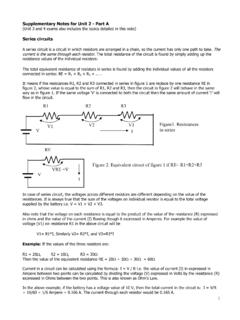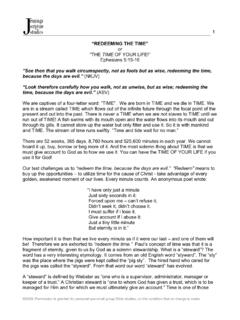Transcription of THE WILL TO BELIEVE by James
1 THE WILL TO BELIEVE by William James An Address to the Philosophical Clubs of Yale and Brown Universities. Published in the New World, June, 1896. IN the recently published Life by Stephen of his brother, Fitz- James , there is an account of a school to which the latter went when he was a boy. The teacher, a certain Mr. Guest, used to converse with his pupils in this wise: "Gurney, what is the difference between justification and sanctification?- Stephen, prove the omnipotence of God " etc. In the midst of our Harvard freethinking and indifference we are prone to imagine that here at your good old orthodox College conversation continues to be somewhat upon this order; and to show you that we at Harvard have not lost all interest in these vital subjects, I have brought with me tonight something like a sermon on justification by faith to read to you, --I mean an essay in justification of faith, a defence of our right to adopt a believing attitude in religious matters, in spite of the fact that our merely logical intellect may not have been coerced.
2 'The Will to BELIEVE ,' accordingly, is the title of my paper. I have long defended to my own students the lawfulness of voluntarily adopted faith; but as soon as they have got well imbued with the logical spirit, they have as a rule refused to admit my contention to be lawful philosophically, even though in point of fact they were personally all the time chock-full of some faith or other themselves. I am all the while, however, so profoundly convinced that my own position is correct, that your invitation has seemed to me a good occasion to make my statements more clear. Perhaps your minds will be more open than those with which I have hitherto had to deal. I will be as little technical as I can, though I must begin by setting up some technical distinctions that will help us in the end. I Let us give the name of hypothesis to anything that may be proposed to our belief; and just as the electricians speak of live and dead wires, let us speak of any hypothesis as either live or dead A live hypothesis is one which appeals as a real possibility to him to whom it is proposed.
3 If I ask you to BELIEVE in the Mahdi, the notion makes no electric connection with your nature,--it refuses to scintillate with any credibility at all. As an hypothesis it is completely dead. To an Arab, however (even if he be not one of the Madhi's followers), the hypothesis is among the mind's possibilities: it is alive. This shows that deadness and liveness in an hypothesis are not intrinsic properties, but relations to the individual thinker. They are measured by his willingness to act. The maximum of liveness in hypothesis means willingness to act irrevocably. Practically, that means belief; but there is some believing tendency wherever there is willingness to act at all. Next, let us call the decision between two hypotheses an option. Options may be of several kinds. They may be: * 1, living or dead; * 2, forced or avoidable; * 3, momentous or trivial; and for our purpose we may call an option a genuine option when it of the forced, living, and momentous kind.
4 1. A living option is one in which both hypotheses are live ones. If I say to you: "Be a theosophist or be a Mohammedan," it is probably a dead option, because for you neither hypothesis is likely to be alive. But if I say: " Be an agnostic or be Christian," it is otherwise: trained as you are, each hypothesis makes some appeal, however small, to your belief. 2. Next, if I say to you: " Choose between going out with your umbrella or without it," I do not offer you a genuine option, for it is not forced. You can easily avoid it by not going out at all. Similarly, if I say, " Either love me or hate me," " Either call my theory true or call it false," your option is avoidable. You may remain indifferent to me, neither loving nor hating, and you may decline to offer any judgment as to my theory. But if I say, " Either accept this truth or go without it," I put on you a forced option, for there is no standing place outside of the alternative.
5 Every dilemma based on a complete logical disjunction, with no possibility of not choosing, is an option of this forced kind. 3. Finally, if I were Dr. Nansen and proposed to you to join my North Pole expedition, your option would be momentous; for this would probably be your only similar opportunity, and your choice now would either exclude you from the North Pole sort of immortality altogether or put at least the chance of it into your hands. He who refuses to embrace a unique opportunity loses the prize as surely as if he tried and failed. Per contra, the option is trivial when the opportunity is not unique, when the stake is insignificant, or when the decision is reversible if it later prove unwise . Such trivial options abound in the scientific life. A chemist finds an hypothesis live enongh to spend a year in its verification: he believes in it to that extent.
6 But if his experiments prove inconclusive either way, he is quit for his loss of time, no vital harm being done. It will facilitate our discussion if we keep all these distinctions well in mind. II THE next matter to consider is the actual psychology of human opinion. When we look at certain facts, it seems as if our passional and volitional nature lay at the root of all our convictions. When we look at others, it seems as if they could do nothing when the intellect had once said its say. Let us take the latter facts up first. Does it not seem preposterous on the very face of it to talk of our opinions being modifiable at will? Can our will either help or hinder our intellect in its perceptions of truth? Can we, by just willing it, BELIEVE that Abraham Lincoln's existence is a myth, and that the portraits of him in McClure's Magazine are all of some one else?
7 Can we, by any effort of our will, or by any strength of wish that it were true, BELIEVE ourselves well and about when we are roaring with rheumatism in bed, or feel certain tbat the sum of the two one-dollar bills in our pocket must be a hundred dollars ? We can say any of these things, but we are absolutely impotent to BELIEVE them; and of just such things is the whole fabric of the truths that we do BELIEVE in made up, --matters of fact, immediate or remote, as Hume said, and relations between ideas, which are either there or not there for us if we see them so, and which if not there cannot be put there by any action of our own. In Pascal's Thoughts there is a celebrated passage known in literature as Pascal's wager. In it he tries to force us into Christianity by reasoning as if our concern with truth resembled our concern with the stakes in a game of chance.
8 Translated freely his words are these: You must either BELIEVE or not BELIEVE that God is--which will you do? Your human reason cannot say. A game is going on between you and the nature of things which at the day of judgment will bring out either heads or tails. Weigh what your gains and your losses would be if you should stake all you have on heads, or God's existence: if you win in such case, you gain eternal beatitude; if you lose, you lose nothing at all. If there were an infinity of chances, and only one for God in this wager, still you ought to stake your all on God; for though you surely risk a finite loss by this procedure, any finite loss is reasonable, even a certain one is reasonable, if there is but the possibility of infinite gain. Go, then, and take holy water, and have masses said; belief will come and stupefy your scruples,-Cela vous fera croire et vous abetira.
9 Why should you not? At bottom, what have you to lose? You probably feel that when religious faith expresses itself thus, in the language of the gaming-table, it is put to its last trumps. Surely Pascal's own personal belief in masses and holy water had far other springs; and this celebrated page of his is but an argument for others, a last desperate snatch at a weapon against the hardness of the unbelieving heart. We feel that a faith in masses and holy water adopted willfully after such a mechanical calculation lack the inner soul of faith's reality; and if we were of the Deity, we should probably take pleasure in cutting off believers from their infinite reward. It is evident that unless there be some pre-existing tendency to BELIEVE in masses and holy water, the option offered to the will by Pascal is not a living option. Certainly no Turk ever took to masses and holy water on its account; and even to us Protestants these seem such foregone impossibilities that Pascal's logic, invoked for them specifically, leaves us unmoved.
10 As well might the Mahdi write to us, saying, " I am the Expected One whom God has created in his effulgence. You shall be infinitely happy if you confess me; otherwise you shall be cut off from the light of the sun. Weigh, then, your infinite gain if I am genuine against your finite sacrifice if I am not! " His logic would be that of Pascal; but he would vainly use it on us, for the hypothesis he offers us is dead. No tendency to act on it exists in us to any degree. The talk of believing by our volition seems, then, from one point of view, simply silly. From another point of view it is worse tban silly, it is vile. When one turns to the magnificent edifice of the physical sciences, and sees how it was reared; what thousands of disinterested moral lives of men lie buried in its mere foundations; what patience and postponement, what choking down of preference, what submission to the icy laws of outer fact are wrought into its very stones and mortar; how absolutely impersonal it stands in its vast augustness,--then how besotted and contemptible seems every little sentimentalist who comes blowing his voluntary smoke-wreaths, and pretending to decide things from out of his private dream!






